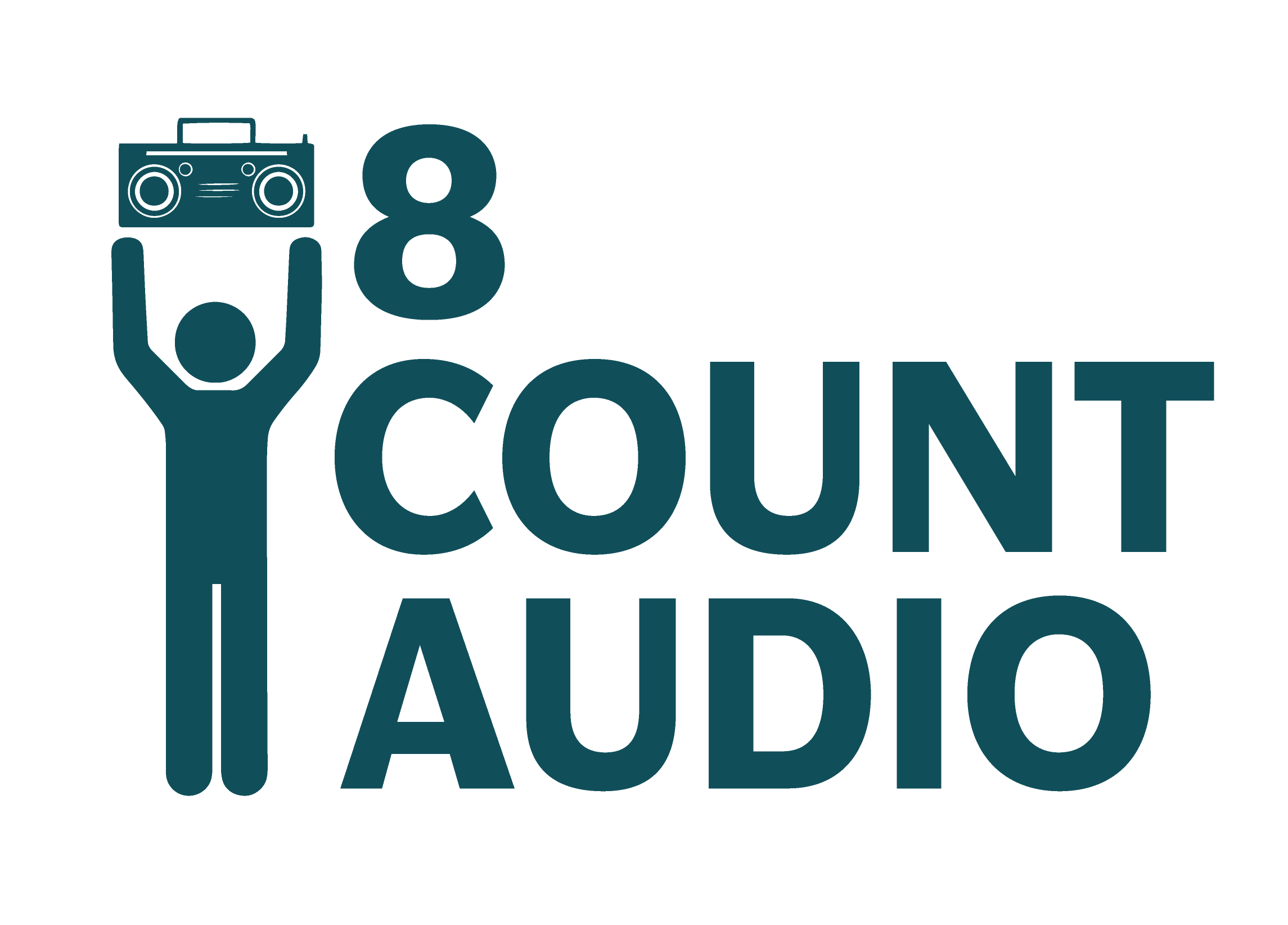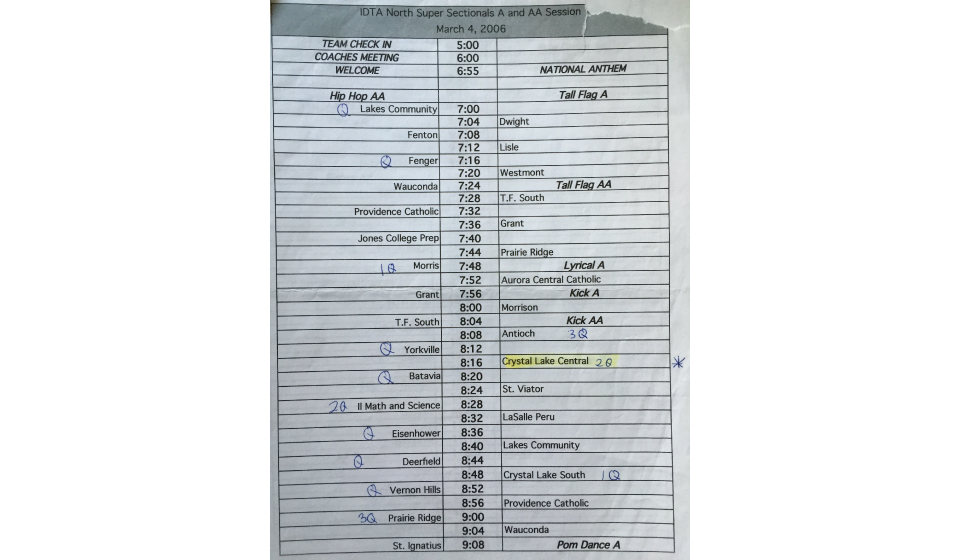Supersectional Saturday
What if I told you that your season used to go deep into March? But first, you had to get through the first Saturday in March.
by Norm Ramil / 8ca.music.person & dance.fan
Not that long ago, here’s how the cycle went. Tryouts in April (maybe early May). Practices and planning out routines throughout the late spring. Maybe get your act together for the Memorial Day parade in your town. Start thinking about that home routine.
And then, glorious, school-free summer. June through August was pretty much like your dance team’s summers today, except you could work on competition routines and music out in the open. Routines could show up looking pretty sharp at the first comps in November.
Fall was pretty much what you know fall to be. The scramble for personal homecoming plans (but your team’s routine had been set and practiced for maybe a couple months). The normal fun of Friday night lights, when you could never tell if you’d have to dress for summer or the chill of fall. One huge difference? No magical IHSA date of October 24th. The team you picked in May was your real, actual team. No stigma of who’s a fall dancer and who’s a competition team member. All dancers, all the time.
Then the season. Comps started in November and throughout December, except without some crazy, holiday-ruining schedule. January wasn’t the meat-grinder it is today, because it didn’t have to be. You had until the end of February to get your routines better and better. And unlike today, February still mattered. You could have all the fun you wanted with basketball dances, guy poms, senior night routines, etc. But no team was out of it. No one was reduced to just halftime entertainment.
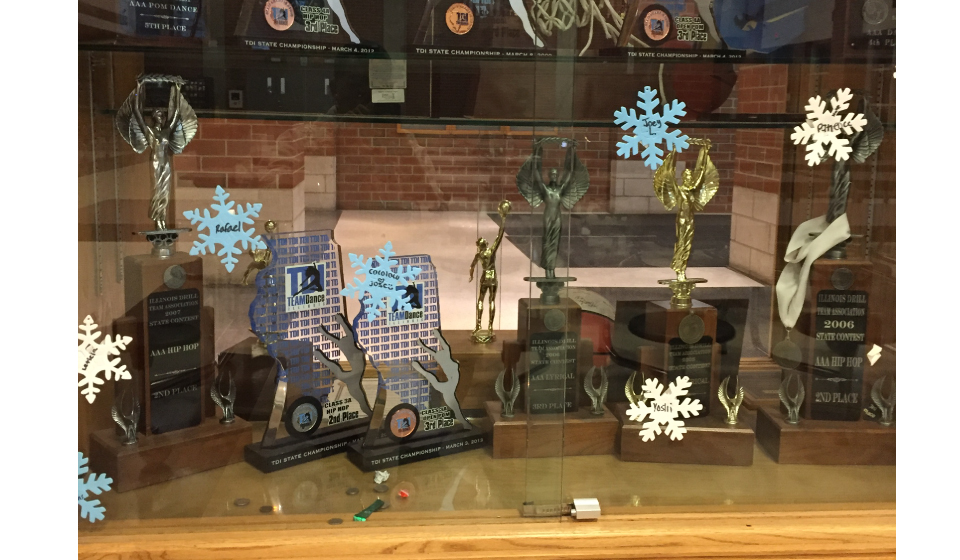 Bartlett battled at the North Supersectional at Joliet West this weekend in 2006, and then got these for their hard work two weeks later in Champaign
Bartlett battled at the North Supersectional at Joliet West this weekend in 2006, and then got these for their hard work two weeks later in ChampaignSo here’s what I love about this quiet first weekend of March. It used to be Supersectional weekend. You’d go to as many competitions as you could handle between November and the last weekend in February. It was category competition, so you had multiple shots at multiple trophies. And whether or not you got a trophy or not, if your score hit a certain level (like, say, an 84), you qualified for Supersectionals.
At all those comps through the winter months, I always loved hearing the top finishers in each category, followed by which teams in that category qualified. Let’s use an example…double-A pom (written as AA pom on the schedule). They’d announce the top 3 in that category, and those teams got trophies. But the bigger prize came next: who qualified for Supersectionals?
Sometimes it would be just 2 of the top 3 in that category, or maybe all 3. Other times it would be the top 3 plus like 3 more teams in AA pom that hit the qualifying score.
In other words, even if you didn’t get a trophy, you might still end up jumping and screaming because you learned you qualified for Supersectionals. It was also kind of fun to watch high-scoring teams politely clap (without much enthusiasm) when they learned they hit the qualifying score—because they’d been hitting it all year and they’d qualified months ago! And it was just like what I saw at the Highland competition this past February 4th, where tons of drama hung in the air. For a lot of hard-working teams, that was their last shot at earning a qualification to Supersectionals (or, these days, just IDTA State).
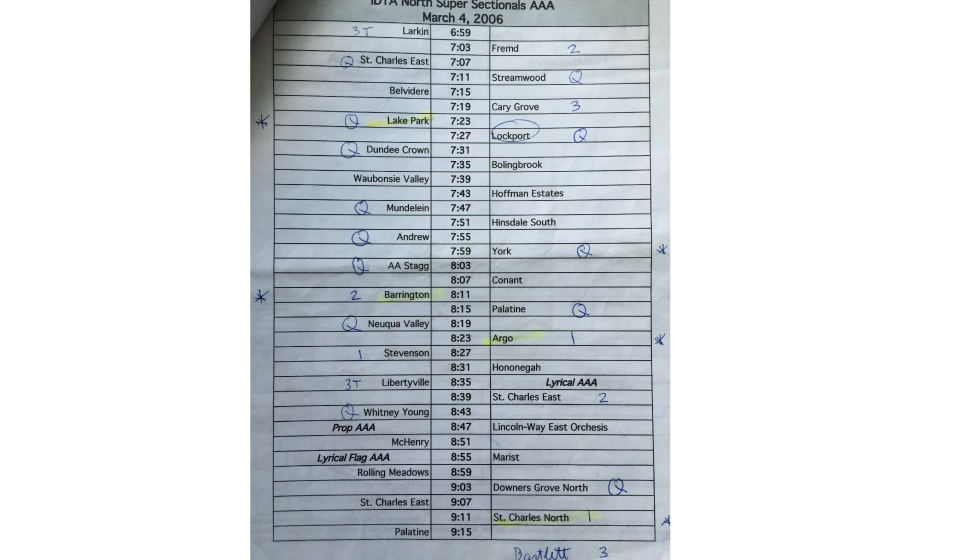 Supersectionals used to go deep into the evening! Note the final rankings plus teams that earned a state-qualifying score (even if they missed out on a category trophy)
Supersectionals used to go deep into the evening! Note the final rankings plus teams that earned a state-qualifying score (even if they missed out on a category trophy)There was a Northern Supersectional and a Southern one, and you can guess which one the Chicago teams went to and which one the St. Louis teams went to. Fremd, Conant, Larkin, St. Charles, Hononegah, Harlem, and Joliet West (and others I can’t remember) each had turns hosting the Northern Supersectional.
Those IDTA Supersectionals were just huge events, almost spectacles. The schedules were wall-to-wall routines from like 7am to 10pm, all good routines, all trying to vie for a state qualification. Rankings got you trophies and pride, but the actual score was what sent you downstate or ended your season. All of this in the first weekend of March in two crowded, hot high school gyms at opposite ends of our state.
Teams that didn’t earn a state-qualifying score at the end of the night could at least have this one, state-like experience where they went up against the best in their half of Illinois in front of the entire dance community. And teams that made it? Time to start making hotel plans for state and planning that bus trip to Champaign, two weeks later. Yup! Two additional weeks to take your razor sharp routine to even crazier levels of state excellence.
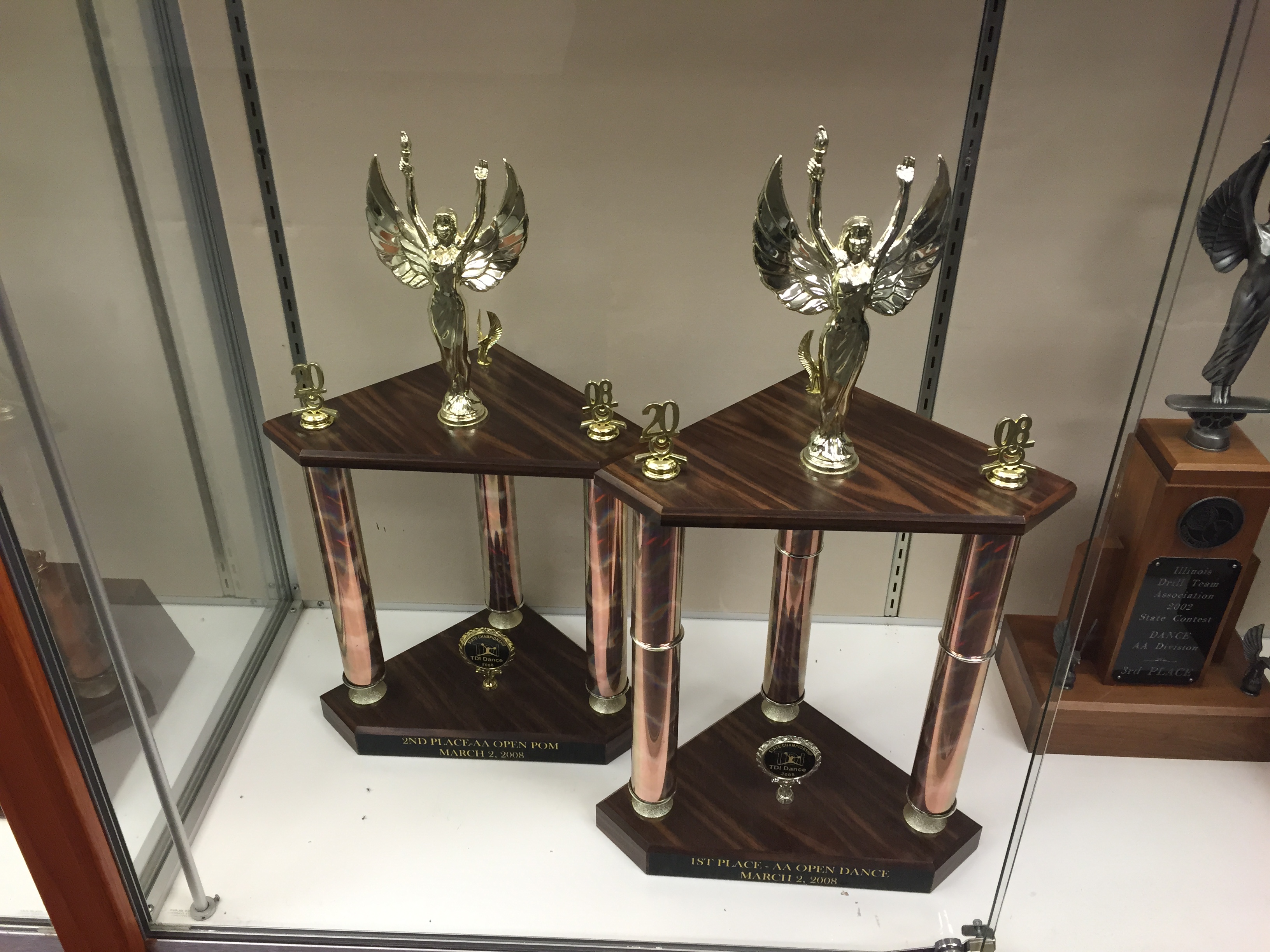 Vernon Hills lifted these above their heads at TDI’s State contest on 3/2/08
Vernon Hills lifted these above their heads at TDI’s State contest on 3/2/08Team Dance Illinois (TDI) streamlined the system a little bit when they first co-existed with IDTA in the 2006-07 season. They envisioned an eventual IHSA sport of poms / dance, so their season slightly mirrored what IHSA might one day do. Comps ran from November through February, and if you hit a qualifying score in your category, you earned a bid to TDI State. So, no Supersectionals layer. TDI State, in Peoria, would be sometime in February or early March.
By the mid-2010s, TDI’s state was moved to NIU, while IDTA’s state was moved to Springfield.
Imagine. Instead of 5 sectional sites and 5 different panels of judges, how about one panel judging each half of the state on a thrilling first-Saturday in March? Instead of taking 6 teams based on their placements (and which sectional you were assigned to), imagine your fate decided by just your score. A score decided by the same pairs of eyes that scored all the other routines in your category—in your half of the state—on the same floor and on the same day.
That was Supersectionals, on this weekend, every March.
February and March used to mean a lot to the dance community, dancing toward a world of potential glory, all against the backdrop of hints of spring.
And that’s why this weekend always means a lot to me.
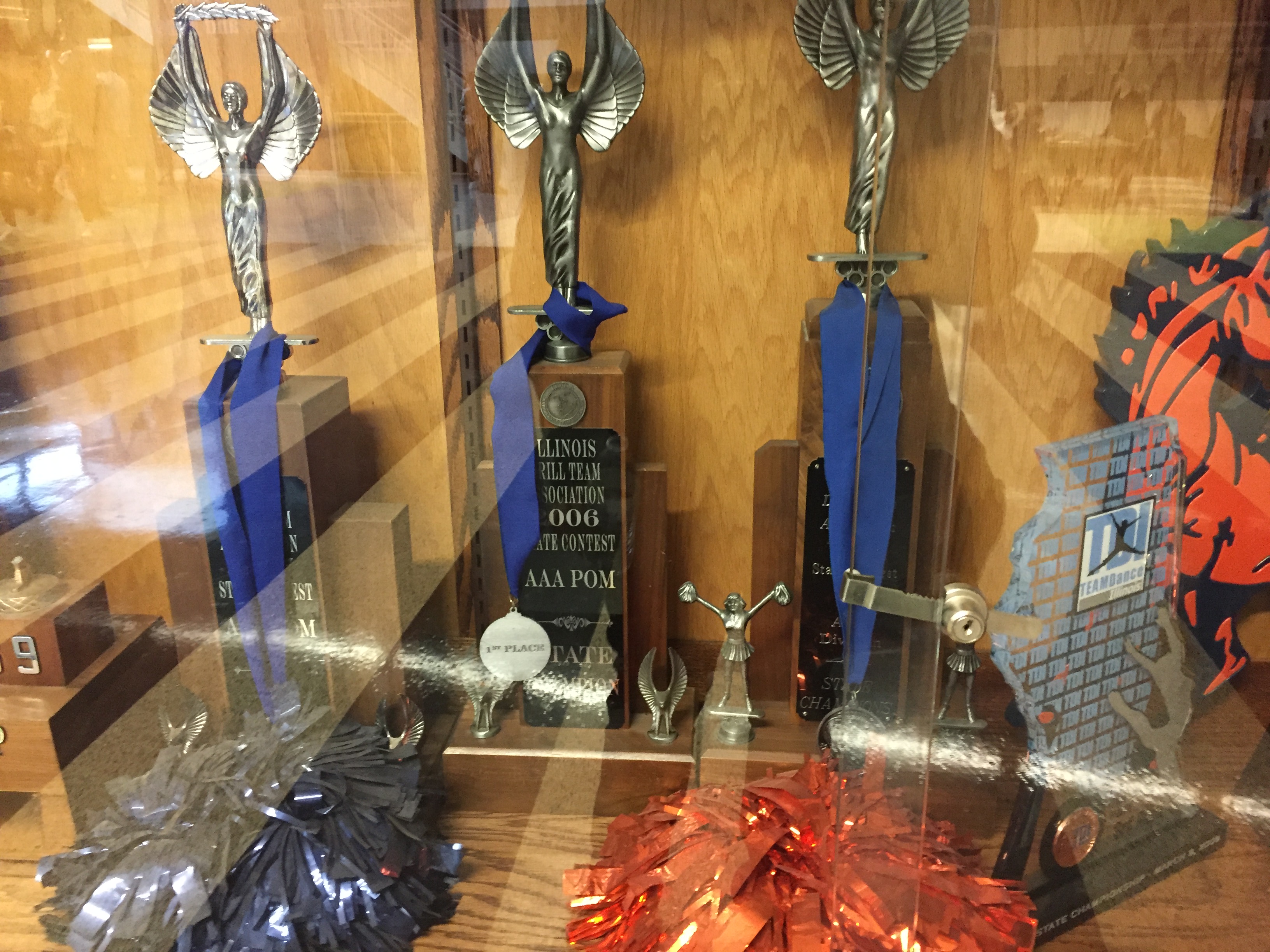 Stagg got through Supersectionals and earned these state trophies two weeks later, a day after St. Patrick’s Day
Stagg got through Supersectionals and earned these state trophies two weeks later, a day after St. Patrick’s Day
